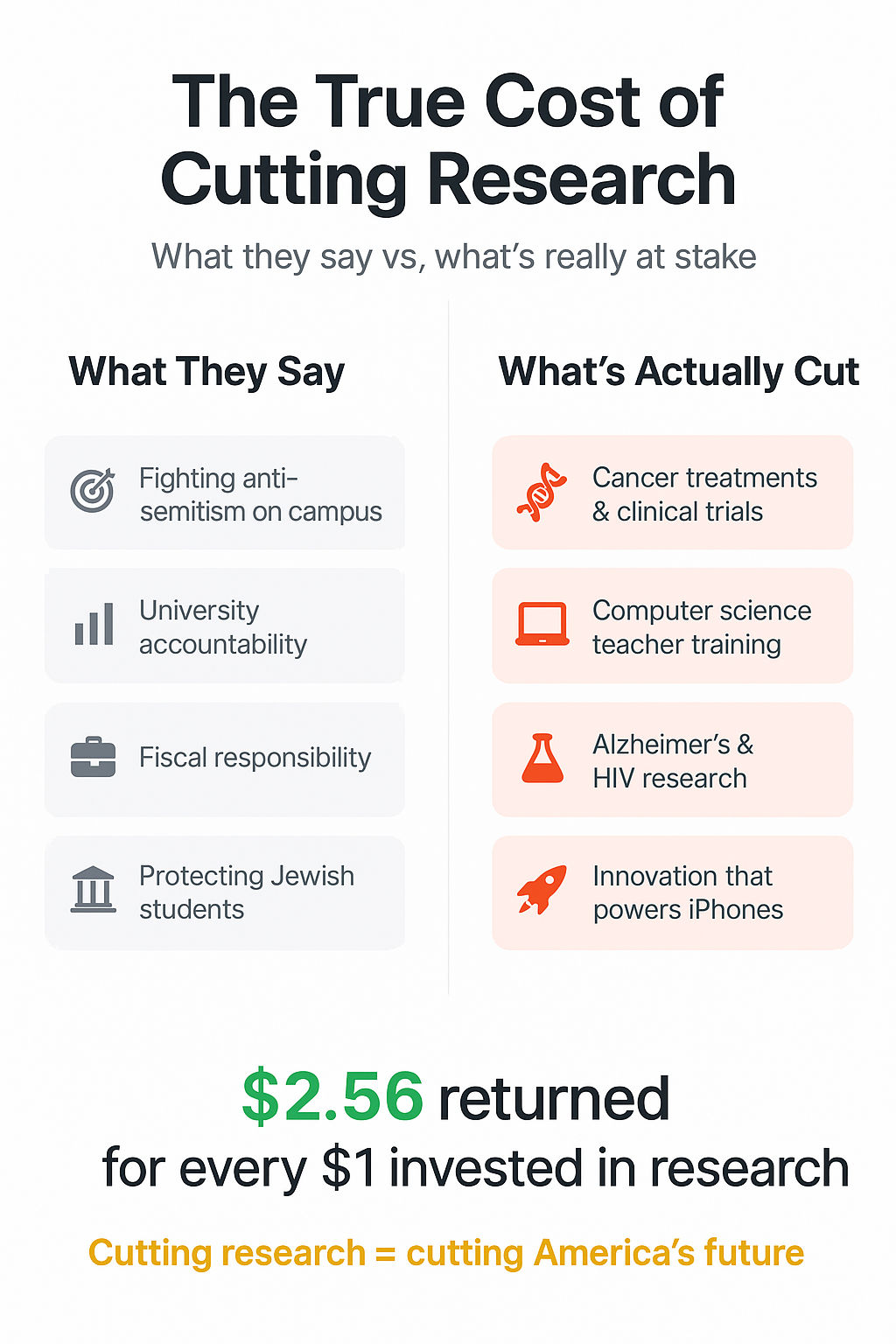The True Cost of Cutting Research: Why Trump's War on Universities Hurts America

Trump's attacks on university research funding are both failing to achieve his stated goals and inflicting lasting damage on American innovation, health, and economic prosperity.
President Trump has launched an unprecedented assault on American higher education, freezing or terminating over $8 billion in federal research grants under the guise of combating anti-semitism. But this campaign reveals a fundamental misunderstanding of both the problem it claims to solve and the immense value of the research it's destroying. Rather than addressing campus concerns about Jewish student safety, these cuts are crippling America's scientific enterprise and squandering one of our nation's most valuable investments.

A Solution in Search of a Problem
The Trump administration justifies these devastating cuts as necessary to combat anti-semitism on college campuses. Yet this explanation crumbles under scrutiny. As the president of Wesleyan University noted, Jewish students protesting for Palestinians represented roughly the same percentage as Jews on campus generally. The idea that attacking universities wholesale combats anti-semitism is, in his words, "a complete charade."
More tellingly, this supposed crusade against anti-semitism is being led by a president with a troubling history on the issue. Trump reportedly kept Hitler's speeches by his bed, dined with Holocaust deniers, and told a rally crowd they wouldn't have to deal with bankers who are "shylocks"—an anti-semitic slur. He was endorsed by David Duke and the KKK, and allegedly told his generals to be more like "Hitler's generals." A federal judge appointed by Reagan observed that in 40 years on the bench, he had "never seen government racial discrimination like this."
The real motivation becomes clear when examining statements from Trump allies like JD Vance, who in 2021 outlined the exact same strategy: "We go to the universities. We use the hundreds of billions of dollars that we send to them as leverage and we say unless you stop indoctrinating our children... you don't get another dime." The anti-semitism angle is simply a convenient pretext for a broader ideological assault on higher education.
The Staggering Economic Returns of Research Funding
What makes these cuts particularly devastating is that they're destroying one of America's best investments. Research funded by the National Institutes of Health alone generates $2.56 in economic activity for every dollar invested, Thats a return that far exceeds most private investments. In fiscal year 2024, NIH's $36.94 billion in research funding supported over 407,000 jobs and produced $94.58 billion in new economic activity nationwide.
Consider the broader economic impact: over the past decade, NIH research funding has driven more than $787 billion in new economic activity and supported an average of more than 370,000 jobs per year. The Human Genome Project, which cost $3.8 billion in federal investment plus $8.5 billion in related research, has generated nearly $1 trillion in economic growth—a 178-fold return on investment that created 4.3 million job-years of employment.
These aren't abstract numbers. At Johns Hopkins University, which faces $4 billion in frozen federal funding, officials announced 2,200 layoffs. The University of Alabama at Birmingham, the state's largest employer with over 28,000 people, generates a $12.1 billion economic impact and supports 107,687 jobs throughout Alabama—all powered significantly by federal research funding.
The Hidden Foundation of American Innovation
Perhaps most importantly, university research serves as the invisible foundation for virtually every technological advancement we take for granted. As the president of Arizona State University explains, "There were probably, by my estimation, 5,000 academic research groups through the decades that had something to do with the technology I'm holding in my hand" when referring to an iPhone. Every aspect of the device—from GPS to touchscreens to the internet connectivity—traces back to university research funded by the federal government.
This pattern repeats across industries. The Internet itself emerged from DARPA funding. GPS came from the military's Navstar program. Touchscreen displays were funded by CIA and NSF grants. Even seemingly simple technologies have surprising academic origins: algorithms powering the $130 billion web hosting industry trace back to studies of how bees optimize their nectar foraging.
The COVID-19 vaccines that saved millions of lives? They built on decades of university research into mRNA technology. Ozempic and similar diabetes drugs? They're based on hormones identified in NIH-funded studies of Gila monster venom. The pattern is clear: today's private sector innovations depend on yesterday's publicly funded basic research.
Immediate Human Consequences
Beyond economic calculations, these funding cuts are causing immediate human suffering. Cancer patients in clinical trials have been told their treatment must stop because grant funding disappeared overnight. As one cancer researcher explained: "One day we hear our grants are cut and the next day we have to say to a patient, sorry, no more money's coming in, so we can't treat you on this trial anymore. And could that patient die as a result? Absolutely."
Researchers with years of data collection—paid for by taxpayers—are now unable to analyze their findings that could benefit millions. A Western Washington University professor working on training more computer science teachers lamented: "Everybody wants more computer-science teachers—and we are on the verge of telling them how to do it—and now we can't!"
San Diego State University, which just achieved the prestigious R1 research university designation, has seen $26 million in remaining grant funding terminated. These cuts affect research into mental health care, HIV/AIDS prevention, and climate change adaptation—all pressing societal needs.
The Brain Drain Threat
The funding chaos is driving away talent at an alarming rate. Academic experts estimate that 20% of polled U.S. scientists are considering leaving for Europe or Canada following the disruptions. The administration's proposed cuts to programs like Research Experiences for Undergraduates—which have launched countless scientific careers through summer research projects—threaten to close pathways for the next generation of American researchers.
As one researcher warned: "If we halt doctoral education because there's no funding for three to four years, you are losing a whole generation of scientists." These aren't just abstract future concerns—they represent America's competitive edge in global innovation slipping away in real time.
A Self-Defeating Strategy
Even from a purely fiscal perspective, these cuts make no sense. Academic experts estimate that cuts to NIH and NSF funding alone will cost the U.S. economy between $10 billion and $16 billion annually in decreased economic output and result in nearly 70,000 lost jobs nationwide. Every dollar "saved" by cutting NIH funding costs the economy $2.56 in returns.
The administration's behavior also undermines its stated goals through contradictory actions. While claiming to fight anti-semitism, it has imposed identical funding cuts on universities that took proactive steps to address the administration's concerns. Northwestern University released a comprehensive plan tracking closely with Trump's demands, only to see $790 million in grants frozen anyway. The university president, a Jewish descendant of Holocaust survivors, was ultimately forced to resign.
The Path Forward
The solution isn't complicated: restore research funding and stop using universities as ideological pawns. Congress must reject the administration's proposed cuts and instead invest in America's future through education and pathbreaking research. As the Association of Public and Land-grant Universities noted, these cuts would "decimate U.S. innovation, productivity, and national security."
Universities themselves must resist these pressure campaigns rather than capitulating to ever-escalating demands. As John Oliver noted in his analysis, "no capitulation will be enough", the administration will simply keep demanding more. Standing firm protects not just institutional integrity but the broader principle that research should serve public needs, not political agendas.
The Real Stakes
America's research enterprise represents more than economic statistics or even scientific breakthroughs. It embodies our commitment to solving humanity's greatest challenges through evidence-based inquiry. When we defund research into cancer treatments to score political points, we're not just wasting money; we're abandoning our responsibility to future generations.
The choice is stark: we can preserve America's position as the global leader in innovation and scientific discovery, or we can sacrifice that leadership on the altar of culture war politics. The current path threatens to transform universities from engines of human progress into ideological battlegrounds, impoverishing our understanding of the world and our ability to improve it.
The research that Trump is cutting today could contain tomorrow's cure for cancer, the next revolutionary technology, or the solution to climate change. We may never know what discoveries we're losing, and that's the most devastating cost of all.
This article is based on reporting from John Oliver's Last Week Tonight analysis of Trump's university policies, as well as other recent news coverage of federal funding cuts, and economic analyses of research investment returns.
John Oliver Analysis:
- "Trump vs. Higher Education: Last Week Tonight with John Oliver (HBO)" - YouTube transcript provided in original document
Current Funding Cuts & Impact
- NEA: "Trump Cancels Federal Research Grants. What Are the Consequences?" - https://www.nea.org/nea-today/all-news-articles/trump-cancels-federal-research-grants-what-are-consequences
- Inside Higher Ed: "Trump Proposes Deep Cuts to Education and Research" - https://www.insidehighered.com/news/government/student-aid-policy/2025/05/02/trump-proposes-deep-cuts-education-and-research
- Inside Higher Ed: "New Details of Trump's Budget Cuts Alarm Researchers" - https://www.insidehighered.com/news/government/science-research-policy/2025/06/03/new-details-trumps-budget-cuts-alarm-researchers
- PBS NewsHour: "How U.S. colleges are navigating cuts to grants for research after Trump restricts federal funding" - https://www.pbs.org/newshour/education/how-u-s-colleges-are-navigating-cuts-to-grants-for-research-after-trump-restricts-federal-funding
- Center for American Progress: "Mapping Federal Funding Cuts to U.S. Colleges and Universities" - https://www.americanprogress.org/article/mapping-federal-funding-cuts-to-us-colleges-and-universities/
- CalMatters: "Judge blocks Trump administration cuts to research funding" - https://calmatters.org/education/higher-education/2025/02/research-funding/
- Nature: "How Trump's attack on universities is putting research in peril" - https://www.nature.com/articles/d41586-025-01289-4
- EdSource: "Federal grant cuts hit California universities hard, putting research in limbo" - https://edsource.org/2025/california-research-grants-federal-funding-trump-administration/733468
- AIP: "Trump Escalates Punitive University Research Cuts" - https://www.aip.org/fyi/trump-escalates-punitive-university-research-cuts
- Washington Post: "Harvard's research is shrinking amid the Trump administration's freeze" - https://www.washingtonpost.com/education/2025/08/25/research-grant-cuts-harvard-trump/
Economic Returns of Research
- NIH: "Spurring Economic Growth" - https://www.nih.gov/about-nih/what-we-do/impact-nih-research/serving-society/spurring-economic-growth
- Harvard Gazette: "NIH funding delivers exponential economic returns" - https://news.harvard.edu/gazette/story/2025/03/nih-funding-delivers-exponential-economic-returns/
- NIH: "Direct Economic Contributions" - https://www.nih.gov/about-nih/what-we-do/impact-nih-research/serving-society/direct-economic-contributions
- FierceBiotech: "Report: Every dollar of NIH research funding doubles in economic returns" - https://www.fiercebiotech.com/research/report-every-dollar-nih-research-funding-doubles-economic-returns
- United for Medical Research: "Annual Economic Report" - https://www.unitedformedicalresearch.org/annual-economic-report/
- NIH: "Impact of NIH Research" - https://www.nih.gov/about-nih/impact-nih-research
- Pharmacy Practice News: "Every $1 in NIH Research Funding Returns $2.56 to the U.S. Economy" - https://www.pharmacypracticenews.com/Policy/Article/03-25/Every-1-in-NIH-Research-Funding-Returns-2-56-to-the-U-S-Economy/76585
- NIH: "Testimony on Driving Innovation through Federal Investments" - https://www.nih.gov/about-nih/who-we-are/nih-director/driving-innovation-through-federal-investments
- LSU: "Investing in Discovery: How NIH Funding Powers Scientific Progress and Economic Growth" - https://www.lsu.edu/blog/2025/02/25-nih-beavers.php
- AAU: "NIH Research Funding Supports Jobs, Fuels the U.S. Economy" - https://www.aau.edu/newsroom/leading-research-universities-report/nih-research-funding-supports-jobs-fuels-us-economy
Innovation & Technology Transfer
- New America: "Universities say they promote economic development, but how?" - https://www.newamerica.org/education-policy/edcentral/universities-say-they-promote-economic-development-but-how/
- Brookings: "Technology and the Innovation Economy" - https://www.brookings.edu/research/technology-and-the-innovation-economy/
- Digital Tonto: "Where Did The iPhone Really Come From?" - https://digitaltonto.com/2013/where-did-the-iphone-really-come-from/
- Harvard Business Review: "How Apple Is Organized for Innovation" - https://hbr.org/2020/11/how-apple-is-organized-for-innovation
Comments ()